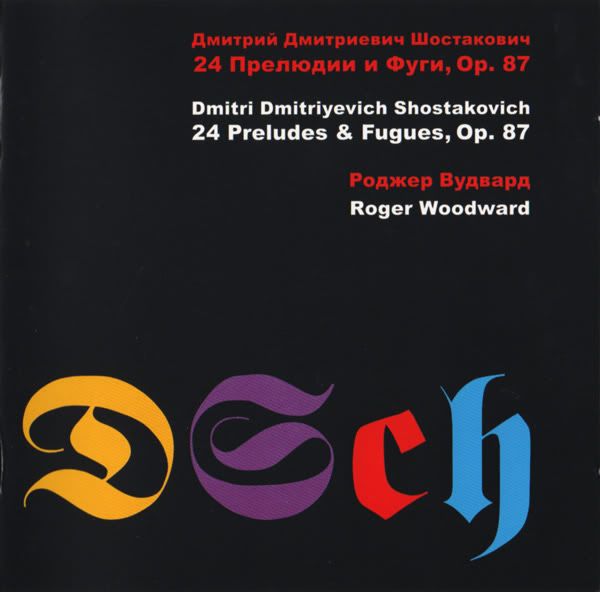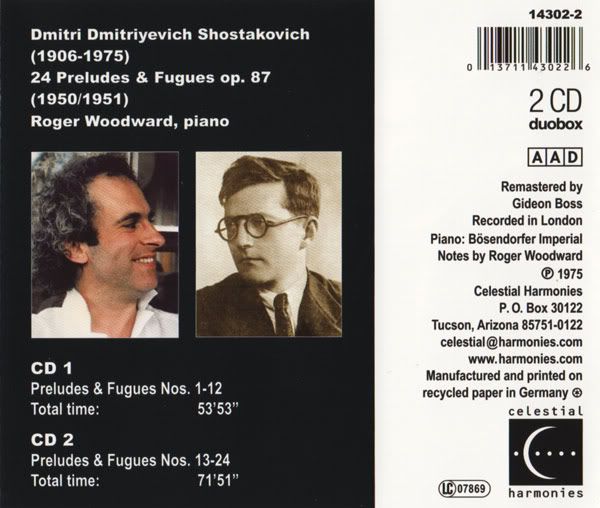Shostakovich - 24 Preludes and Fugues, Op. 87 (1975) [FLAC] {Roger Woodward}seeders: 0
leechers: 0
Shostakovich - 24 Preludes and Fugues, Op. 87 (1975) [FLAC] {Roger Woodward} (Size: 445.08 MB)
Description  This remarkable recording stands alone as a landmark similar to the complete cycle of Shostakovich’s string quartets by the Fitzwilliam Quartet on Decca. As the first recording of the 24 Preludes and Fugues op.87 in the West, it first appeared on a two LP set from RCA. Comparisons can be made, but I doubt there are many serious Shostakovich collectors who won’t be interested in adding Roger Woodward’s recording to their collections. If timings interest, Woodward must come in as one of, if not the quickest on record, completing the entire cycle in just under 125 minutes. Spread over three discs, Tatiana Nikolayeva, the work’s dedicatee, takes around 165 minutes in her 1991 Hyperion recording, the last of three versions including the very first, done in 1962. Treading more middle ground, Vladimir Ashkenazy in his 1999 Decca recording comes in at about 142 minutes, as does Keith Jarrett on ECM at around 135 minutes, though his fugue tempi can at times be slow to the point of dissipation. In his extensive booklet notes – worth the price of this release alone, Roger Woodward goes into some of the performing tradition which surrounds Op.87, mentioning Shostakovich’s own ‘notoriously dry keyboard style’ against which those by the legendary Sviatoslav Richter are notably superior. Richter, who frustratingly never recorded a complete Op.87 cycle, was however respectful of Shostakovich’s sound-world, and in following it more closely created something different to Tatiana Nikolayeva’s ‘more traditional romantic conception’. It would appear that Nikolayeva’s approach was the one which caught on more with younger generations of pianists in Russia and in the West, but with Roger Woodward’s leaning towards the more rugged and objective style of the alternate school represented by the composer himself, we at least now have a context for differences in interpretation. Woodward’s seeming extremes of speed can take a little adjusting to, but once you have entered this often heroic and breathtaking world it soon begins to feel as if one will take more than adjustment to be able to accept more familiar ‘romantic’ performances. Only on a few occasions might an argument for a little more restraint be entered, for instance in the Fugue No.5 in D major for instance, where the repeated notes and rhythmic distinctness become a little blurred. That said, if it were taken slower it might stick out like a sore thumb in the context of the rest, so I’m not really complaining. What often happens with these preludes and fugues is that their melodic content takes on a different meaning, their character and colour emerging with a life and vibrancy which brings new associations. There are examples all over the place, and each piece throws up new questions and resolutions. Back to the Prelude No.5, and the counter melody which is passed between left and right hand, standing opposite all those gently grandstanding spread chords, takes on a new shape and flow, and a logic and sense I hadn’t noticed before. Another prelude, No.8, reaches beyond its usual sense of lightness and wit, to project an added layer of the grotesque or the caricature. The subsequent fugue is less an elegiac and poetic statement, more an uncomfortable and desolate landscape of slipping shale and shrill winds. Brisk tempi are never seen as a substitute for sensitivity, and while the nth degree of tonal colour may not be at the forefront of Woodward’s readings there is plenty of detail and deeply considered phrasing in each piece. As the figures race and dive, that memory of Bach comes through more strongly in places such as the Prelude No.10. That heroic element which is strong elsewhere, concludes disc one with a high impact Prelude No.12 which has all the power of a tank rolling into a village – and then melting into a flower-strewn memory as the mood is transformed 1:30 in. Brittle and unyielding as the following fugue may appear at first, the music-revolutionary feel is here in this music as it rarely was to the same effect in Shostakovich after the extremes of his second and third symphonies, and the first piano sonata. Sensitivity is the word for the Prelude No.13, with Woodward’s tempo being roughly the same as Ashkenazy’s, but without ‘feature’ accompanying chords: Ashkenazy sometimes clipping the first few while allowing the last to rest and sustain. There are split notes here with Woodward, which wouldn’t matter too much except they both occur at exactly the same place. The subsequent fugue is like a dream, from which one awakes too soon, wishing that the beauty could have embraced us just a little longer. Short of going through every piece blow-by-blow, there are a few favourite highlights and one or two further points to be made. One of the features I like about Vladimir Ashkenzy’s recording is the atmosphere he creates, clearly responding to the deeply Russian landscapes and moods created by Shostakovich. Woodward has this feeling as well, and despite some over-pedalling here and there I think most listeners will feel the chill Siberian winds on the composer’s neck as much as he himself must have. It’s not all about swiftness either. The Prelude No.15 is actually taken slower than Ashkenazy, turning it into much less of a party bon-bon, more a Party memo introducing new legal requirements to ‘be joyful, or else’. The technically fearsome fugue which follows is done with magnificently manic malice. There are very few edits in evidence by the way, though the final note here is chopped off just a fraction too soon. More used to hearing the Prelude No.16 as warmly welcoming, Woodward plays it with the colour of clenched teeth, the tension like that of thin ice rather than grassy fields caressed by and Autumn breeze. This feeling is communicated to the fugue, which retains the glimmer of light on crystal rather than on limpid water, the trill-like ornaments worked tightly in the French baroque tradition rather than in the slow Glenn Gould manner. Where Shostakovich is spinning out his material in an orchestral way such as in the Preludes 18 and 19, Woodward is also prepared to take his time and develop the narrative to appropriate effect. The weighted continuum of the Prelude No.22 is jaw-droppingly atmospheric, and would be the one I would chose for the soundtrack of my next spy movie. Woodward’s tempo is the same as Keith Jarrett here, but his urgency and sense of texture with the repeated notes makes all the difference. That penultimate Prelude No.23 delivers, though is less overtly tear-jerking than some – more a statement of resignation than a lyrical outpouring of emotion. Defiance in spades is released in the final Prelude No.24, the gentle central section dropping to almost medieval simplicity, here played with unpretentious directness of expression. The final fugue is a serene farewell which winds up to a fevered climax, more desperate than defiant in Woodward’s case, a raging from behind the bars of prison rather than a transcendent victory. This is a fairly old but rather good sounding analogue recording which has been re-mastered by Celestial Harmonies for this release. The piano sound is quite rich and detailed, the warmth of the Bösendorfer communicated well. The bass notes do lose the eq fight somewhat, having less weight than one might have expected, and the breadth of colour isn’t as wide as it might be, but there are no distressing bumps and distortions. The unnamed acoustic is rather confined but not uncomfortably so, and the mild tape hiss is both easily ignored, and a reassurance that the treble range hasn’t been unnaturally restricted in an attempt to achieve digital silence. This is a recording of its time, but also a very welcome alternative to the more romantic recordings to which we have become accustomed. There are things to be said for most of the recordings currently available, and the strengths of these are not really undermined by the forceful argument Roger Woodward gives for a different view. This alternative is both closer in time, and arguably closer in spirit to the way Shostakovich would have heard these pieces. This may not be to everyone’s taste. While of the three comparison recordings I’ve mentioned it would be Vladimir Ashkenazy who I would keep as a companion to Woodward, there is no doubting Nikolayeva’s expressive strength and depth in this music despite a few technical deficiencies in the most extreme passages. Unfortunately the track-listings with this release lump each prelude and fugue together rather than giving them separate access points, which would have been preferable. Minor gripes aside, this is a superb opportunity to hear a historically relevant and at times revelatory recording. The presentation is excellent, with Roger Woodward’s own informative and personal notes running to over 22 pages of small print. The witty DSCH done in a high gothic ‘J.S. Bach’ typeface is also well done. Having heard this, it has become a version of Shostakovich’s 24 preludes and Fugues Op.87 without which my collection will never again feel in any way complete. Dominy Clements Flac + cue + log. Scans 300dpi PNGs, booklet.pdf. Enjoy. Sharing Widget |